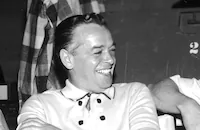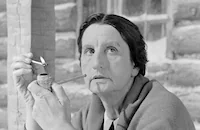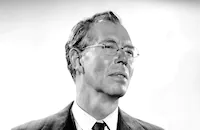Thieves' Highway

Brief Synopsis
Cast & Crew
Jules Dassin
Richard Conte
Valentina Cortesa
Lee J. Cobb
Barbara Lawrence
Jack Oakie
Film Details
Technical Specs

Synopsis
Nick Garcos returns to his home in Fresno after a long sea voyage working as a mechanic and is welcomed home by his parents and girl friend, Polly Faber. Nick, who has saved a lot of his pay and plans to go into business with Polly's father, is unaware that his father has lost his legs in a truck accident, which appears to have been arranged by Mike Figlia, a crooked fruit and produce dealer in San Francisco. Money allegedly paid to Mr. Garcos by Figlia was also "lost" in the accident. Unable to work, Nick's father sold his damaged truck to Ed Kinney, who patched it together but still owes money on it. Nick suggests that he and Ed go into business together to truck a new crop of apples into San Francisco, and Ed cancels an agreement he made with two other truckers, Slob and Pete. Nick and Ed acquire another truck and head for the apple orchard. When Ed tries to cheat the orchard owners, Nick tells him to honor the deal he made. Slob and Pete then show up at the orchard and, not pleased about the new partnership, follow Nick and Ed with a load of their own. Nick's truck blows a tire and, as he tries to jack the truck up, it falls on him. Ed stops, pulls Nick out and repairs the flat, and they continue on. Nick arrives first at the San Francisco produce market and goes to see Figlia. After Nick's truck is sabotaged in front of Figlia's place, he meets Rica, a girl who works for Figlia, at a lunch counter in the market. She invites him to rest in her nearby apartment, and while he is there, Figlia has Nick's truck unloaded and begins to sell the apples on consignment. However, when Nick discovers that Figlia is selling the load at $6.50 a box but intends to pay him substantially less, he demands and receives cash and a check for the full amount. He then phones Polly and asks her to come to San Francisco so they can be married. Nick buys Rica a drink to celebrate his sale, and she tells him that Polly is probably marrying him for his money. As they walk back to the market, Nick is attacked by two of Figlia's thugs, Mitch and Frenchy, and Rica picks up his wallet and runs off. Nick, thinking that Rica was in league with the thugs, goes looking for her. However, the thugs find Rica first and take the wallet. Meanwhile, Ed's truck starts to fall apart on a steep downhill slope, then crashes and bursts into flames with Ed trapped inside. When Polly arrives in San Francisco, she is met by Rica and is unhappy to learn that Nick is resting in her room. Slob and Pete then try to sell their load of apples to Figlia, but Slob angers Pete when he ghoulishly offers to go back to pick up the apples around Ed's crash site. After Rica tells Polly that Nick has been robbed of all his money, Polly walks out on him. Confused by Rica's behavior, Nick accuses her of setting him up. She warns him that Mitch and Frenchy may try to kill him, as she knows they have arranged truck accidents before. Early the next morning, Nick goes to the market and meets Slob, who tells him that Ed is dead and that Figlia and his henchmen are scavenging his cargo. As Nick and Slob head out to the crash scene, Rica phones the police. Figlia and Pete are celebrating in a bar when Nick and Slob show up. After Pete discovers that Figlia has underpaid him, Figlia tries to leave, but Nick grabs him and beats him up, forcing him to say that he has a check for Nick's father and that he will make up all the other losses. The police arrive, take Figlia into custody and warn Nick about taking the law into his own hands. Nick returns to Rica and they plan a life together.

Director

Jules Dassin
Cast

Richard Conte

Valentina Cortesa

Lee J. Cobb

Barbara Lawrence

Jack Oakie

Millard Mitchell

Joseph Pevney

Morris Carnovsky
Tamara Shayne
Kasia Orzazewski
Norbert Schiller

Hope Emerson

George Tyne
Edwin Max
David Clarke

Walter Baldwin

David Opatoshu
Ann Morrison
Percy Helton
Maurice Samuels
Saul Z. Martell
Howland Chamberlin
Irene Tedrow
Dick Wessel
Frank Kreig
Mario Siletti
Jim Nolan
Robert Foulk
Harry Wilson
Vincent Gaspari
Silvio Giannini
Charles Chackerian
Vincent Sbragia
John Lorriea
Salvatore Daniele
Gino Bomben
John Gorman
Earl Nutter
Anthony Dentoni
Raymond Brunetti
Arthur Fidgeon
Antone Silvestri
Andrew Quock
Joseph Scarpa
Eddie Vinci
Crew
Robert Bassler
A. I. Bezzerides
Norbert Brodine
Bud Brooks
Alfred Bruzlin
Gene Bryant
Esperanza Corona
Nick Demaggio
W. F. Fitzgerald
Chester Gore
Earle Hagen
Paul Helmick
Ray Jones
Charles Lemaire
Harry M. Leonard
Thomas Little
Leo Mccreary
D. S. Mcewen
F. L. Mcgarry
Pat Mcnally
Kay Nelson
Alfred Newman
Lionel Newman
Ray Nolan
Ben Nye
Tom Pryor
Joe Rickards
Fred Rode
Stanley Scheuer
Fred Sersen
Roger Shearman
William E. Watts
Henry Weinberger
Lyle Wheeler
Darryl F. Zanuck

Photo Collections
Videos
Movie Clip



Hosted Intro
Film Details
Technical Specs

Articles
Thieves' Highway

Thieves' Highway
Jules Dassin (1911-2008) - TCM Schedule Change for Director Jules Dassin Memorial Tribute on Friday, April 20th
Sunday, April 20th
8:00 PM Naked City
9:45 PM Topkapi
TCM REMEMBERS JULES DASSIN (1911-2008)
Jules Dassin gained experience in theater and radio in New York before going to work in Hollywood in 1940, first with RKO (as assistant director) and then with MGM. Dassin hit his stride in the late 1940s with such dynamic (and still well-regarded) film noir melodramas as "Brute Force" (1947), "The Naked City" (1948), "Thieves' Highway" (1949) and "Night and the City" (1950), starring Richard Widmark who died this past Monday, March 24th.
After being blacklisted he moved to Europe, where he scored his greatest international successes with the French-produced "Rififi" (1955) and the then-scandalous "Never on Sunday" (1959), starring his second wife Melina Mercouri. For the most part, his later films--such as "Up Tight" (1968), an ill-conceived black remake of John Ford's 1935 classic "The Informer"--have been disappointing and inconclusive. Dassin, however, maintained that among his own films, his personal preference was "He Who Must Die" (1958), starring his wife Melina Mercouri. It is one of his least known films and is rarely screened today but here is a description of it: "Greece, in the 1920's, is occupied by the Turks. The country is in turmoil with entire villages uprooted. The site of the movie is a Greek village that conducts a passion play each year. The leading citizens of the town, under the auspices of the Patriarch, choose those that will play the parts in the Passion. A stuttering shepherd is chosen to play Jesus. The town butcher (who wanted to be Jesus) is chosen as Judas. The town prostitute is chosen as Mary Magdalene. The rest of the disciples are also chosen. As the movie unfolds, the Passion Play becomes a reality. A group of villagers, uprooted by the war and impoverished, arrive at the village led by their priest. The wealthier citizens of the town want nothing with these people and manipulate a massacre. In the context of the 1920's each of the characters plays out their biblical role in actuality."
Family
DAUGHTER: Julie Dassin. Actor. Mother, Beatrice Launer.
SON: Joey Dassin. Mother, Beatrice Launer.
SON: Rickey Dassin. Mother, Beatrice Launer.
Companion
WIFE: Beatrice Launer. Former concert violinist. Married in 1933; divorced in 1962.
WIFE: Melina Mercouri. Actor, politician. Born c. 1923; Greek; together from 1959; married from 1966 until her death on March 6, 1994.
Milestone
1936: First role on New York stage (Yiddish Theater)
1940: First film as assistant director Directed first stage play, "The Medicine Show 1941: Directed first short film, "The Tell-Tale Heart"
1942: Feature directing debut, "Nazi Agent/Salute to Courage"
Jules Dassin (1911-2008) - TCM Schedule Change for Director Jules Dassin Memorial Tribute on Friday, April 20th
Thieves Highway
Unlike other noir thrillers of its era, Thieves' Highway opens in the sun-baked landscapes of central California and not on some rain-slicked city street at night. Even the protagonist, Nick Garcos (Richard Conte), is atypical for the genre; he's not a two-bit hustler or a corrupt cop or some other urban character. He's a returning GI and the son of Greek immigrants - a genuine working class hero. Almost immediately, the joyful homecoming turns dark as Nick discovers his father, a trucker, has been permanently disabled by an accident - one which implicates a notorious San Francisco produce dealer named Mike Figlia (Lee J. Cobb). Nick sets out to avenge his father, teaming up with Ed (Millard Mitchell), an older trucker, on a run to San Francisco with an early harvest of Golden Delicious apples. Nick's plan - to sell the crop to Figlia at the highest price he can get before revealing his true identity - is sidetracked by various problems along the way including unreliable vehicles, dangerous curves in the road and a prostitute (Valentina Cortese) hired to distract Nick from his objective.
One aspect that gives Thieves' Highway an edge is Dassin's expose of the corruption of the wholesale produce market and the way the working class is exploited by the system. In this way, the film shares some of the same social concerns that inform the work of John Steinbeck such as In Dubious Battle and The Grapes of Wrath. Instead of migrant workers, it's honest, hard working truck drivers who are victimized in Thieves' Highway. If the film shares some similarities to another early noir set in the trucking industry - They Drive by Night (1940) - it's because both films were based on novels by A. I. Bezzerides. The author, who adapted Thieves' Highway to the screen, is often acknowledged as one of the best practitioners of the genre, with screenplays for Kiss Me Deadly (1955) and On Dangerous Ground (1952) to his credit. His knack for creating complex, morally ambiguous characters who are never what they seem to be on the surface is in full bloom here. This is particularly true of the way in which the two women in Nick's life are presented - Polly (Barbara Lawrence), his blonde, seemingly innocent fiancee, is eventually revealed as a grasping golddigger whose motives are far more duplicitous than Rica (Cortese), the hooker who first betrays and then falls in love with Nick.
Any discussion of Thieves' Highway would also have to mention the striking black and white cinematography of Norbert Brodine which captures the hazards of independent hauling in purely visual terms. One of the most unforgettable images in the film - as iconic and powerful as any key scene from On the Waterfront (1954), Citizen Kane (1941) or other recognized masterpiece - is the sequence where Ed loses control of his rig, sending his cargo cascading down an embankment. Thousands of apples tumble down the hillside while Ed perishes in his burning vehicle, all of it grimly observed by two fellow produce truckers who are powerless to stop the disaster at hand. In scenes like this, the film looks ahead to the psychologically tense and fatalistic thriller, The Wages of Fear (1953).
Last but not least, Valentina Cortese as the predatory Riva is riveting in one of her first American films. Not a conventional beauty queen by Hollywood standards or even a typically alluring femme fatale on the order of a Jane Greer or Rita Hayworth, she nonetheless conveys an earthy sensuality and unexpected playfulness that contrasts sharply with her hard knocks profession. Even when she's raking her nails across Nick's back or planning to double cross him, she conveys conflicting emotions and possible clues to her true nature. In one of the extra features on the disc - an interview with Dassin - we learn that Cortese was romantically involved with her director at the time. Some of her mannerisms and her delivery of dialogue with a distinct European flavor may even remind you of Melina Mercouri, the star of Dassin's Never on Sunday (1960), who later became Mrs. Dassin.
The Criterion DVD of Thieves' Highway is a class A production all the way from its spotless transfer to the generous extra features. Among these are the aforementioned Dassin interview (recently recorded), a trailer for The Long Haul of A.I. Bezzerides (a documentary still in production), the theatrical trailer and a well-informed audio commentary by Alain Silver that could serve as the perfect primer for a college course in film noir. Breaking down Dassin's style in visual terms and providing extensive cultural and literary references (at one point, he interprets the film as a contemporary Greek myth), Silver is much less concerned with trivia and behind the scenes information like so many audio commentaries. While this approach might be a tad too scholarly for some movie watchers, it will be much appreciated by those who feel Dassin's work in the 1947-1950 period has been seriously undervalued. Thieves' Highway is an essential purchase for any film noir lover and his other film noir, Night and the City, also available from Criterion, is also highly recommended.
For more information about Thieves' Highway, visit Criterion Collection. To order Thieves' Highway, go to TCM Shopping.
by Jeff Stafford
Thieves Highway
Quotes
Trivia
Notes
The working titles of this film were Hard Bargain and Collision. According to documents in the Twentieth Century-Fox Records of the Legal Department Collection in the Arts-Special Collections Library at UCLA, the studio purchased the rights to A. I. Bezzerides' unpublished novel The Red of My Blood in January 1948 for $37,500. Bezzerides was hired at $1,000 per week, with a ten-week guarantee, to write the screenplay. The film started production, in the San Francisco produce market, through the cooperation of the Wholesale Fruit and Produce Dealers Association. Later, however, when the novel was scheduled to be published under the title Thieves' Market and the studio decided to use that title for the film, the Dealers Association protested vigorously. Twentieth Century-Fox production head Darryl F. Zanuck was reluctant to change the title and, in a memo to the Legal Department, wrote, "We state definitely that Thieves' Market pertains only to [character] Mike Figlia's market and we go out of our way to clean up the rest of the market. Therefore it seems to me that we are not guilty in any respect of damaging anyone...You can talk to Mr. Skouras [the studio's president] about it when he gets out here but I refuse to be put in the position of costing the Company added revenue. If we had committed a wrong or if we were harming someone then I would feel differently but this is not the case."
Early casting suggestions for the leading role included Dana Andrews and Victor Mature. Actors Frank Richards, Al Eben and Joe Haworth are credited in some cast lists in minor roles, but their participation in the released film is doubtful.
According to the file on the film in the MPAA/PCA Collection at the AMPAS Library, the film encountered problems with the PCA. In February 1949, the PCA stated that it could not "approve this picture in its present form because of the characterization of the girl Rica as a prostitute...Some extensive eliminations must be made as well as the addition of several new scenes." Producer Robert Bassler agreed, in late Feb, to shoot a new scene introducing Rica and indicating that she had regular, paid employment as a fortune teller. Bassler also agreed that excisions would be made, in dialogue and action, in scenes between Rica and Nick. Retakes were scheduled for early March 1949. The PCA issued a certificate in June "with the understanding that all prints are to be identical with the cut version shown in our projection room on June 13th." It is assumed that this is the version released, but in neither of the two prints viewed is there a scene in which Rica is established as anything other than a prostitute until the very end when she is seen reading cards in a bar. Additionally, the dialogue continuity, dated July 18, 1949, submitted with the copyright registration, does not include the strong anti-vigilantism dialogue spoken by a policeman to Nick after he has beaten up Figlia: "You know you can't take the law into your own hands. Taking care of guys like Figlia is our job."















